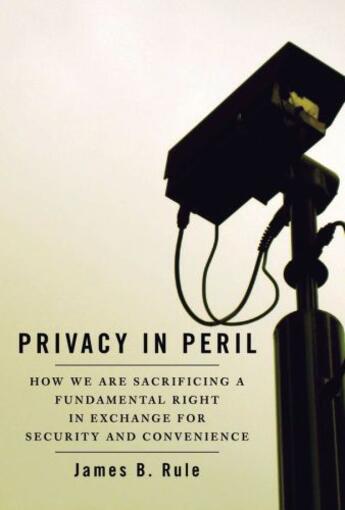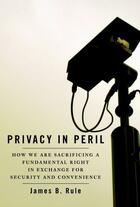-
Nombre de pages : (-)
-
Collection :
(-)
-
Genre :
(-)
-
Thème :
Non attribué
-
Prix littéraire(s) :
(-)
Résumé:
We are all accustomed to privacy horror stories, like identity theft, where stored personal data gets misdirected for criminal purposes. But we should worry less about the illegal uses of personal data, James B. Rule argues, and worry a lot more about the perfectly legal uses of our data by the... Voir plus
We are all accustomed to privacy horror stories, like identity theft, where stored personal data gets misdirected for criminal purposes. But we should worry less about the illegal uses of personal data, James B. Rule argues, and worry a lot more about the perfectly legal uses of our data by the government and private industry, uses which are far more widespread and far more dangerous to our interests than we'd ever suspect.
This provocative book takes readers on a probing, far-reaching tour of the erosion of privacy in American society, showing that we are often unwitting accomplices, providing personal data in exchange for security or convenience. The author reveals that in today's "information society," the personal data that we make available to virtually any organization for virtually any purpose is apt to surface elsewhere, applied to utterly different purposes. The mass collection and processing of personal information produces such tremendous efficiencies that both the public and private sector feel justified in pushing as far as they can into our private lives. And there is no easy cure. Indeed, there are many cases where privacy invasion is both hurtful to the individual and indispensable to an organization's quest for efficiency. Unrestricted snooping into citizens' personal finances really does boost the profitability of the consumer credit industry. Insurance companies really can and do make more money by using intimate private data to decide whom to insure, and what to charge. And as long as we willingly accept the pursuit of profit, or the reduction of crime, or cutting government costs as sufficient reason for intensified scrutiny over private citizens' lives, then privacy values will remain endangered.
Rule offers no simple answers to this modern conundrum. Rather, he provides a sophisticated and often troubling account that promises to fundamentally alter the privacy debate.
Donner votre avis















